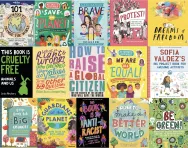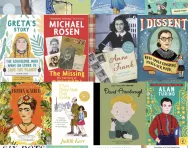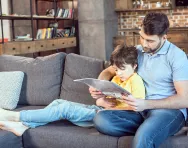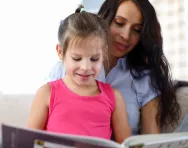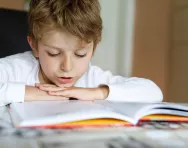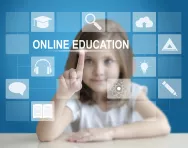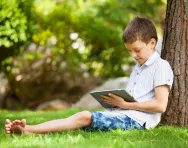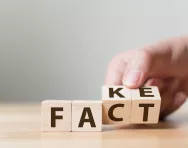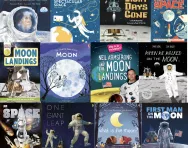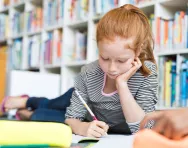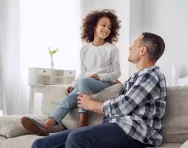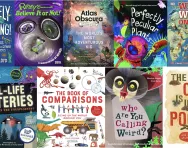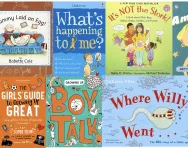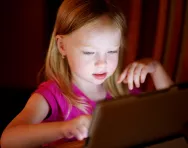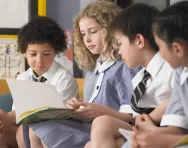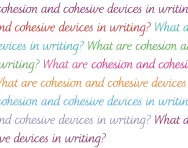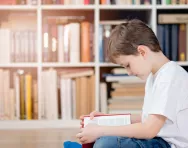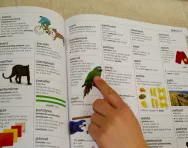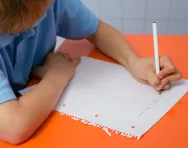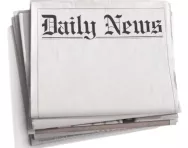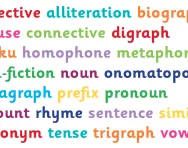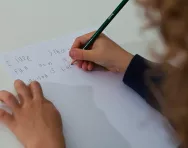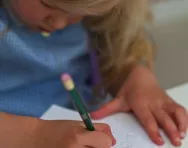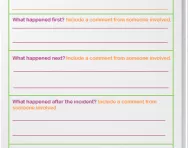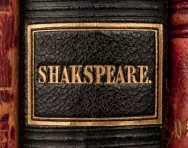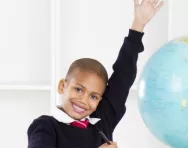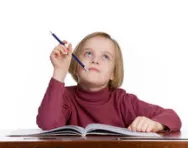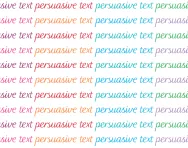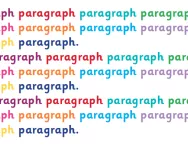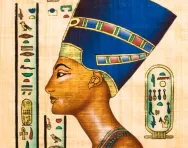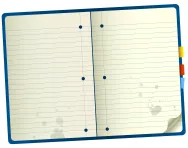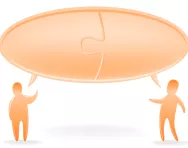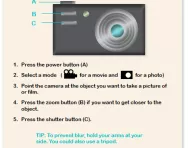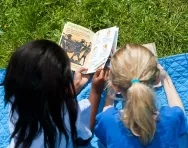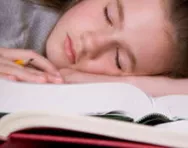Best books for budding young activists
Our children's generation have the opportunity to change the world for the better, becoming guardians of our planet and promoting equity and social justice. Help them understand the role they will play in protecting people and environment and show them that every one of us can make a difference with this selection of inspiring, positive kids' books about activism and activists.
Best biographies and autobiographies for children
Biographies and autobiographies bring the lives of influential people to life for young children, highlighting the role exceptional individuals have played in our shared history. Introduce your child to the world's greatest artists, activists, scientists, inventors and humanitarians with books aimed at every age group. Each biography and autobiography is bursting with anecdotes, imagery and information, sure to inspire young people to follow their own dreams and aspirations.
How to get your child interested in the news
We asked the experts at Newsround and First News for their advice on raising a child with a keen interest in current affairs.
Best literacy resources
Whether your child is just learning to read and print letters or looking for ways to put their creative writing skills to the test, we've rounded up some fantastic resources to help them practise phonics, grammar, story-writing and comic-creating at home. Plus there are loads of different ways to connect with authors and listen to stories.
60 reading challenges for primary school kids
Great ideas for keeping your child engaged with reading and broadening their taste in books.
12 of the best home learning websites for kids
We've rounded up some of our favourite online resources to support your child's learning at home.
Interviewing to write a biography
Writing an in-depth profile of a grandparent or family friend will help your child develop interview skills, learn to write up notes and introduce them to family heritage, stories and legends that they might never have heard! Use our suggested questions to help set up a conversation to remember.
Best reading apps for kids
Encourage and develop your child's passion for reading with these brilliant book apps for kids.
How to help your child spot fake news
How good is your child at telling what’s true and what isn’t? We take a look at how to help them develop digital literacy and identifying "fake news" in our connected world.
Best kids' books about the moon landings and space exploration
Brilliant books to help kids find out about our fascination with the Moon and human beings' extraordinary journey to set foot on its surface in 1969. Whether your child is in Reception or Year 6, we've selected great non-fiction titles about the people who have influenced space history to feed their astronomical ambitions.
Why writing book reviews is great for kids
Writing book reviews can help your child engage more deeply with what they're reading, find their next favourite series or author and develop their writing skills. Georgina Atwell, founder of kids' book review website Toppsta, offers her tips for helping your child share their love of reading with other bookworms.
Teaching kids about current affairs
How do we help children understand what's going on in the world in an age-appropriate way? We have top tips for helping them make sense of the news.
Best curious facts books for children
Is your child fascinated by the world around them? Amazed by the wonders of flora, fauna and human achievement? This bumper selection of non-fiction books is packed with information about the strangest, scariest, silliest and most spectacular aspects of our world. Be prepared: you'll have a pint-sized trivia expert dominating dinner-table discussions for years to come!
Best children's books about puberty and sex
Clear, accurate information that's age-appropriate is essential when you decide to use a book to help you discuss puberty and sex with your children. We've picked some of the best books to help you make potentially awkward conversations easier, whatever your child's age. You know your child best, so always check you're happy with the level of detail and information in a book before you share it with them.
Best apps for new readers
Reading doesn't always have to involve books. We've rounded up the best apps for children who are learning to read, ranging from traditional tales to interactive games that will improve their reading as they play.
Inspiring children to read
When it comes to encouraging children's love of books and reading, teachers (and librarians!) are the experts. We asked Ashley Booth – reader, Year 6 teacher and passionate advocate of children's books – to share his tips for teachers (and for parents!) on igniting a love of reading in primary-school children.
What are cohesion and cohesive devices in writing?
As children start to develop their own writing style in primary school they will be asked to use "cohesive devices" to improve their writing and help it flow. We explain what "cohesion" means in fiction and non-fiction writing.
Expanding your child’s reading tastes
Is your child stuck in a reading rut? Lucy Dimbylow takes a look at how to encourage them to test the water with different styles and genres of fiction and non-fiction.
Best reference books for children
Reference books and dictionaries offer us information that's accurate, well researched and beautifully presented and are invaluable when you're working on a homework project. From atlases to dictionaries and encyclopedias, we recommend some of the best English, maths, science, history and geography reference books for primary-school children.
5 ways to turn your child into a budding writer
While some children love nothing more than sitting down with a blank sheet of paper and a pen, others are filled with dread at the thought of writing much more than their name at the top of their worksheet. Teacher and author Alison Wilcox shares her tips for encouraging the writing bug.
What is journalistic writing?
Hold the front page! Primary-school children study the features of news reports (headlines, pictures, captions, quotations) and often learn to write their own article, usually related to a theme they are studying. Here's how you can support their learning at home.
Primary literacy glossary for parents
From adjectives to writing frames, TheSchoolRun's primary-school literacy glossary offers a complete guide to all the concepts children are taught in EYFS, KS1 and KS2 English. Brush up on your own literacy skills, clear up homework confusion and understand exactly what your child is learning at school by reading our basic definitions (with links to more detailed explanations, teachers' tips and examples).
What is text-marking?
Text-marking is a technique taught in schools to help children recognise the different features of a text. Find out how teachers explain the technique to children and how it can help with their comprehension of different types of texts.
What is extended writing?
At school your child will be expected to produce pieces of extended writing, which is a writing task completed independently. Find out how teachers will help your child develop this skill and how you can support their learning at home.
What is a writing frame?
Your child will be taught to use a writing frame to help them set out stories they are writing. Find out how teachers explain how to use a writing frame and the features they contain.
What are biography and autobiography?
In Key Stage 2 your child will learn about biographical and autobiographical texts. Find out about the features of these texts and help your child write their own texts at home.
What is an explanation text?
An explanation text is a specific type of writing and includes some identifiable features. Find out how your child's teacher will teach explanation texts and what your child needs to include in their own explanation texts.
What is a non-chronological report?
A non-chronological report is a piece of text that isn't written in time order. Find out how your child is taught to read and write non-chronological reports in primary school.
What is persuasive writing?
Persuasive text is written to make the reader do something. Children are taught this form of non-fiction text in Key Stage 2; we explain the key features of persuasive text and how you can support your child's learning at home.
What is a paragraph?
Paragraphs are sections of text, used to structure writing to make it clear and easy to read. We explain how the use of paragraphs is taught in KS2 and how you can help your child improve their writing by using paragraphs at home.
What is an information text?
Information texts are an important part of primary school literacy lessons. We explain the features of this non-fiction genre, why note-taking matters and how to help your child at home.
What is a recount?
Has your child been asked to write a recount? Find out what the main features of this kind of non-fiction text are, plus how recounts are used in primary school literacy lessons.
What is argument text?
Argument texts are studied and written in KS2 literacy. We explain the features to look out for in this non-fiction genre and how to help your child structure and write their own argument text correctly.
What is instruction text?
We read instruction texts on an everyday basis. In primary school your child will be taught to recognise the main features and write increasingly complicated instruction texts as part of their non-fiction literacy work.
What is non-fiction?
Non-fiction texts are read, studied and written throughout the primary-school years. Our parents' guide covers instruction texts, recounts, information and explanation texts, persuasive writing and argument texts and explains what you need to know to support your child.
SATs revision: your KS2 SATs English helper
Boost your child's confidence before the Y6 English assessments with these handy tips and literacy activities that you and your child can work on together.
